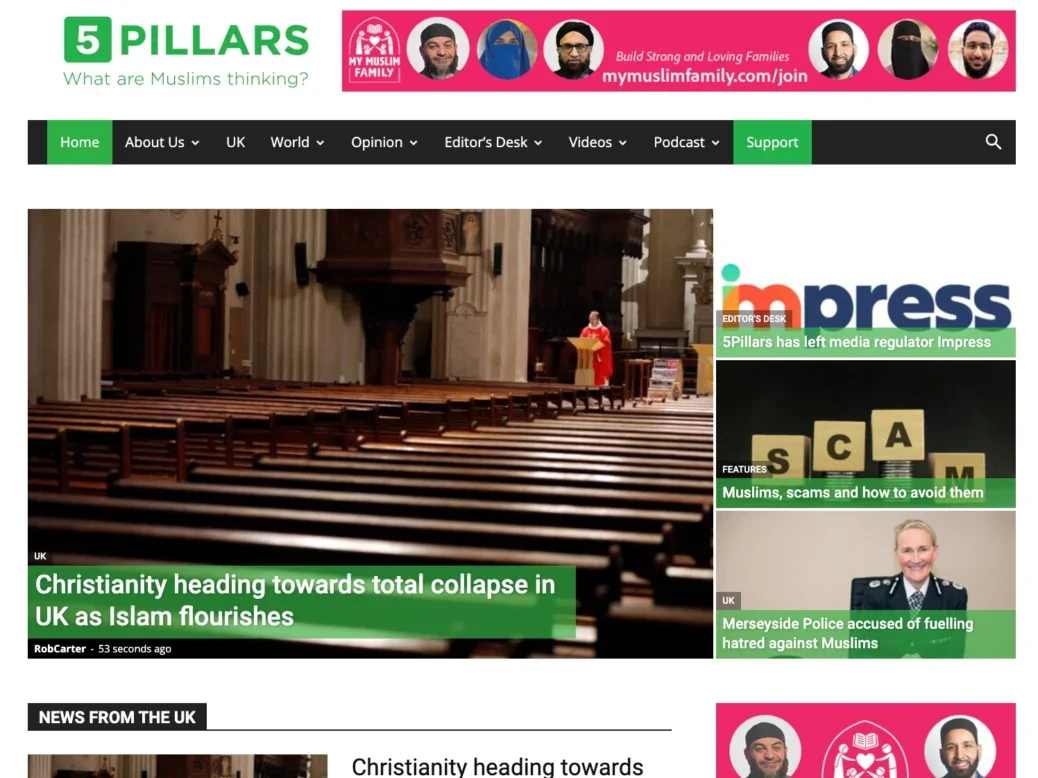
Muslim news site 5Pillars has left press regulator Impress after having a second discrimination ruling upheld against it within a year.
5Pillars, which has been under Impress regulation since 2018, said the body “is run by what we perceive to be liberals whose values are not compatible with Islamic norms”.
Impress ruled on Thursday that a May episode of 5Pillar’s podcast Blood Brothers breached its standards code because the host had allowed a guest, the former deputy leader of Britain First, to “espouse antisemitic conspiracy theories without pushback or challenge”.
The guest, Jayda Fransen, had made claims including that “Jews” were “behind the abortion industry” and “the LGBTQPZ plus agenda”.
5Pillars defended itself by saying that Fransen was notorious among Muslims for what they called anti-Islam rhetoric and that they did not endorse her views or dispute allegations she is an anti-Semite.
The regulator summed up 5Pillars’ position saying it “interviewed her due to her relevance to British Muslims and because it believes in engaging with and challenging those it disagrees with, which it says is important in a democracy that values free speech”.
The regulator’s decision follows another ruling in May this year that saw Impress order 5Pillars to alter or remove a Blood Brothers episode which it said encouraged “hatred and abuse” towards Jewish and LGBT people.
In that case the interviewee had been Mark Collett, the leader of a far-right group and who Impress said had also been met with “insufficient challenge from the interviewer”.
In June, following that ruling, 5Pillars gave Impress notice that it would leave its regulatory scheme.
Impress nonetheless carried out its investigation and ruled — the day after 5Pillars formally announced its departure — that the site should remove or amend the interview. The episode, titled “Britain First, Christian nationalism, and the Zionist agenda”, remains online at time of writing.
5Pillars editor envisions advent of an Islamic press regulator
Impress is one of two UK press regulators. Impress, which was designed on principles laid down by the Leveson Inquiry, predominantly oversees newer, digital-native outlets such as Novara Media, Journo Resources, Desmog and The Bureau of Investigative Journalism, as well as some print titles such as Prospect magazine.
The other regulator, IPSO, covers most national and regional newspaper and magazine titles. A handful of national titles — The Guardian and Observer, The Independent and the Financial Times — have opted to self-regulate.
Announcing its departure, 5Pillars editor Roshan Muhammed Salih said the title was leaving Impress because “we do not want non-Muslims who do not share our values to have editorial control over our content”.
The publisher signed up in the first place, he wrote, “because we wanted our readers and viewers to know that we were serious about adhering to professional editorial guidelines”.
However it was rapped by Impress in 2021 over a social media post that described homosexual sex as a “crime against God”, after which “complaints about 5Pillars kept coming in, especially from our detractors in the pro-Israel and pro-LGBT lobby…
“It became clear to us that our enemies were trying to utilise Impress to bog us down with numerous complaints.”
He wrote that 5Pillars would continue to adhere “to the majority of the professional guidelines set out in the Impress Standards Code”.
Salih said he hoped to eventually see “the emergence of an external regulator – but a Muslim one that will judge us according to the Quran and Sunnah…
“An independent Muslim media regulator – which 5Pillars and other Muslim media could join – would send a strong signal to the community (as well as non-Muslims) that Muslims take journalism seriously.”
Responding to the departure of 5Pillars, Impress said: “We are of course disappointed that 5Pillars came to the decision to leave Impress earlier this year.
“It is our strong belief that it is better for both publishers and the public that recognised independent regulation is taken up as widely as possible to preserve journalistic integrity across the sector.
“Unfortunately, until there are genuine incentives put in place by Government and the industry for that to happen, publications will continue to be free to do as they please, including discriminating against protected groups with no recourse or consequence.”
[Read more: IPSO v Impress — Ten years after Leveson, how are the press ‘watchmen’ faring?]
Email pged@pressgazette.co.uk to point out mistakes, provide story tips or send in a letter for publication on our "Letters Page" blog
